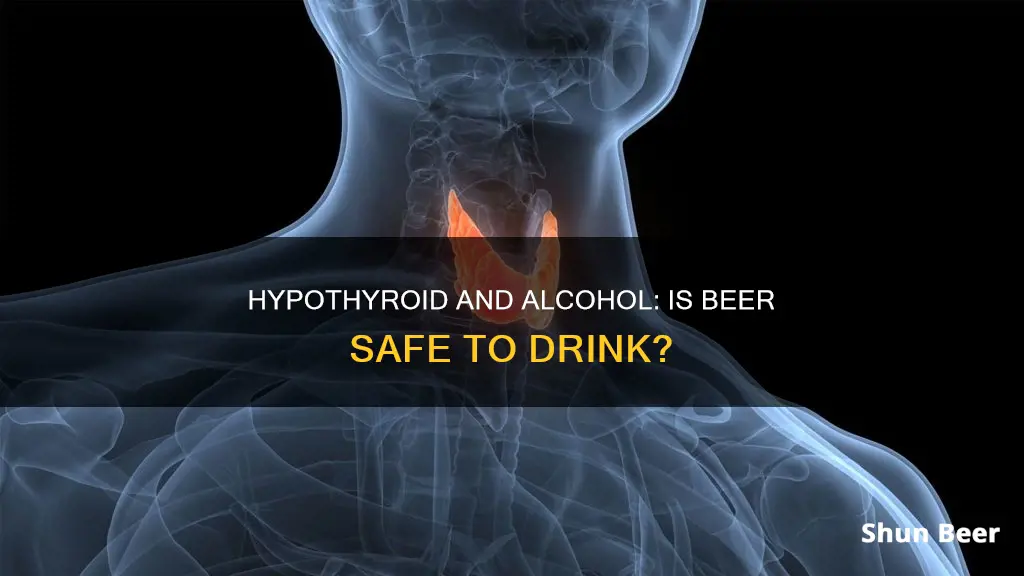
Alcohol is known to have an impact on thyroid function. While some studies suggest that moderate alcohol consumption may decrease the risk of hypothyroidism, others indicate that alcohol causes cellular toxicity, which results in a direct suppression of thyroid function.
Heavy alcohol use has been linked to a reduction in thyroid hormones T4 and T3, and a blunted thyroid-stimulating hormone (TSH) response to thyrotropin-releasing hormone (TRH) from the hypothalamus gland. This can lead to hypothyroidism, or underproduction of thyroid hormones.
However, the impact of alcohol on thyroid function is complex and not yet fully understood. Some studies have found a decreased risk of thyroid cancer and autoimmune hypothyroidism with moderate alcohol consumption.
Therefore, while there may be some potential benefits, it is important to note that heavy drinking can have negative effects on overall health and may worsen thyroid-related symptoms. It is always best to consult with a healthcare professional to determine what is right for your individual situation.
| Characteristics | Values |
|---|---|
| Alcohol's impact on thyroid function | Alcohol can affect thyroid function, but the specifics are unclear. Some studies show that moderate alcohol use decreases the risk of hypothyroidism. Other studies report that alcohol causes cellular toxicity, which results in a direct suppression of thyroid function. |
| Alcohol's impact on thyroid hormones | Alcohol causes direct cellular toxicity of thyroid cells, leading to reduced production of T3 and T4 hormones. Heavier alcohol use is associated with a more significant reduction of T3 hormones. |
| Alcohol's impact on thyroid conditions | Alcohol may worsen symptoms of hypothyroidism and hyperthyroidism. |
| Alcohol's impact on thyroid cancer | Studies have found that light to moderate alcohol use may have a protective effect against thyroid cancer. However, heavy drinkers and people who have been drinking for more than 10 years don't seem to experience as much or any protective benefit from drinking alcohol. |
| Alcohol's impact on thyroid medications | Alcohol is not known to affect the way levothyroxine works. However, it may make certain side effects such as headaches and sweating worse. |
What You'll Learn

Alcohol can cause thyroid hormone suppression
The effect of heavy alcohol use on the hypothalamic-pituitary-thyroid axis, also known as thyroid homeostasis, is significant. Alcohol reduces the thyroid hormones T4 and T3 and blunts the thyroid-stimulating hormone (TSH) response to thyrotropin-releasing hormone (TRH) from the hypothalamus gland. This is known as indirect suppression.
Alcohol may also reduce thyroid volume, which is the sum of the volumes of both lobes of the thyroid gland. This reduction is due to alcohol's direct toxic effect on thyroid cells.
Beer and Doxycycline: Is It Safe to Drink?
You may want to see also

Alcohol may reduce thyroid volume
The reduction in thyroid volume is also associated with a reduction in T3 and f T3 concentrations, with normal T4, f T4, and TSH values in most studies. The severity of thyroid fibrosis in alcoholics correlates with the duration and total dose of alcohol use rather than peak blood levels. Studies show that chronic alcohol users have more fibrosis than acute binge drinkers.
The toxic effect of alcohol on thyroid volume is independent of liver damage. A significant reduction in thyroid volume has been reported in ultrasound studies in alcohol-dependent patients without liver cirrhosis when compared to healthy controls.
The Art of Beer: A Guide to Flavorless Sipping
You may want to see also

Alcohol may increase the risk of hypothyroidism
The effect of heavy alcohol consumption on thyroid homeostasis is notable, as it reduces the thyroid hormones T4 and T3 and blunts the thyroid-stimulating hormone (TSH) response to thyrotropin-releasing hormone (TRH) from the hypothalamus gland. This reduction in thyroid hormones is due to alcohol's direct toxic effect on thyroid cells.
Additionally, alcohol can affect the immune system, cause chronic inflammation, and damage the liver, which is critical for thyroid hormone conversion. Alcohol can also interfere with estrogen processing in the liver, leading to estrogen dominance and further hormone disruption. Furthermore, alcohol increases intestinal permeability, contributing to "leaky gut," a condition that allows toxins to enter the bloodstream and cause inflammation.
While moderate alcohol consumption may offer some health benefits, such as reducing the risk of heart disease or preventing Alzheimer's disease, it is advisable for those with a thyroid condition to limit or abstain from alcohol. This is particularly important for those with autoimmune diseases, as they are more susceptible to developing a leaky gut.
Is Beer Safe During Pregnancy?
You may want to see also

Alcohol may worsen hypothyroid symptoms
Heavy drinking may affect the production of thyroid hormones and make hypothyroid symptoms worse. For example, alcohol may suppress thyroid hormone production in chronic alcohol users. Additionally, alcohol can affect the immune system, cause chronic inflammation, and damage the liver, which is critical to thyroid hormone conversion.
Furthermore, alcohol use can interfere with how the body processes estrogen. If the liver cannot effectively process estrogen, it can build up in tissues, causing estrogen dominance and activating the body's stress response. Alcohol can also cause a direct increase in intestinal permeability, contributing to "leaky gut," a condition that allows toxins to leak into the bloodstream and cause inflammation.
While moderate alcohol consumption may have some health benefits, such as reducing the risk of heart disease or preventing Alzheimer's disease, it is best to limit or abstain from alcohol if you have a thyroid condition. Heavy drinking may worsen hypothyroid symptoms, and individuals with thyroid disorders or a susceptibility to hypothyroidism should be cautious.
Exploring Jordan's Beer Culture and Drinking Laws
You may want to see also

Alcohol may negatively impact the immune system
Alcohol can have a detrimental impact on the immune system, which may be of particular concern to those with hypothyroidism. Alcohol can affect the immune system in several ways, including:
- Increasing intestinal permeability, leading to "leaky gut syndrome", a condition that is often implicated in chronic diseases, especially those of an autoimmune nature.
- Lowering white blood cell count, including neutrophils and macrophages, which play a critical role in immune function.
- Damaging the white blood cells themselves, specifically, changing the structure of macrophages and T-cells.
- Promoting inflammation throughout the body. Alcohol consumption can destroy the "good bacteria" in the gut microbiome, allowing inflammatory cytokines to spread.
- Interfering with healthy sleep, which is known to protect against infection.
- Causing liver damage, which impairs the body's ability to remove harmful substances.
In addition, alcohol can also affect the endocrine system, including the thyroid. Alcohol has been shown to reduce levels of thyroid hormones T3 and T4 and blunt the thyroid-stimulating hormone (TSH) response. It can also reduce thyroid volume due to its toxic effect on thyroid cells.
Therefore, while moderate alcohol consumption may have some health benefits, such as reducing the risk of heart disease, those with hypothyroidism may want to limit or abstain from alcohol to avoid further health complications.
Beer and GERD: What You Need to Know
You may want to see also







